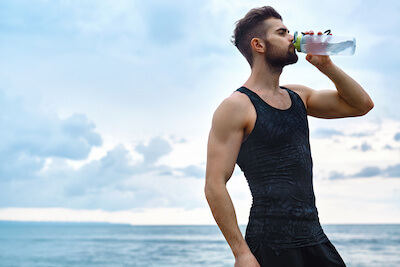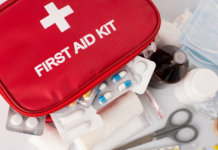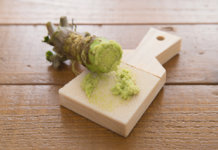Why You (Probably) Need to Drink More Water
As we all know, staying hydrated is an important aspect of good health. However, many of us guys may not even realize that we need to drink more water until it is too late and afflictions such as headaches, kidney stones or lethargy set in.
This is because we often go with what we “feel” is enough water, or even drink only a set amount each day without compensating for factors such as weather, activity level or use of diuretics. We may also avoid drinking enough fluids due to the frequent urination it causes, which can be a legitimate concern at times.
However, knowing how to stay comfortably hydrated along with understanding the dangers of not doing so can make all the difference in how you approach this common health dilemma.
Symptoms and Dangers of Dehydration
If you are like many of us, you may not be aware of the symptoms of needing to drink more water.
These include:
- Dark, concentrated, smelly urine
- Headaches
- Dry skin, eyes and mouth
- Not sweating during exercise or hot weather
- Muscle cramps and spasms
- Confusion and difficulty concentrating
- Low energy
- Muscle weakness
- Constipation (1)
There is also the most obvious symptom of dehydration, which is thirst. However, relying on drinking to your thirst may not be good enough since thirst doesn’t appear until we are already 1-2% dehydrated. Plus, a quick trip to the drinking fountain to quench your thirst probably isn’t enough, even though it does sate you for now. (2)
Even worse, chronic dehydration can lead to dangerous health conditions such as:
- Kidney stones
- Damaged kidneys resulting in their reduced function
- Urinary tract infections
- Dementia
- Hypertension (4)
This is also just the tip of the iceberg health wise, since such things as poor kidney function and high blood pressure can lead to other dangerous conditions throughout the body such as heart attack, stroke, type II diabetes, kidney disease and metabolic syndrome. (5, 6)
How to Stay Hydrated
So far as increasing your daily fluid intake, there is some good news in that it doesn’t necessarily require lots of water all day long. This is because many foods contain fluids which can be counted toward your daily intake without the discomfort of forcing down yet another glass of water.
For instance, cucumbers are around 95% water, and yogurt is about 88% water they can add to your daily intake. Coffee and tea—long thought to cause, rather than alleviate dehydration—can also be counted toward your daily fluid needs so long as you stick to 4-or-fewer cups per-day. (7, 8)
However, foods like pretzels, nuts and nearly anything processed can contain as little as 1%, and foods high in oils and sugars even less. This means you need to look for foods which aren’t too fatty, processed or sugary and instead stick to whole fruits, vegetables, dairy and fluids such as juice.
Of course, this doesn’t mean not to keep a bottle of water at hand throughout the day. However, since your daily needs change with activity levels, humidity and temperature, there is no set “daily requirement,” for fluid intake (forget the 8×8 rule, in other words). Instead, the most accurate indicator of adequate hydration is the color of your urine and frequency of urination. If your urine is dark and concentrated, you need to drink more until it’s a pale, clear color such as lightly brewed tea. Depending on other conditions such as your bladder size and age, you should also be urinating around 6-7 times per-day. (9)
However, for a good night’s sleep, be sure to concentrate your fluid intake during the day and taper off towards bedtime. Remember to also mind foods you are consuming late, since eating something like a large cucumber salad with watermelon can have the same effect as drinking lots of water right before bed.
Staying Hydrated Means Staying Healthy
Chronic dehydration is a real problem for many of us, and can lead to some serious health problems. This is in addition to the immediate effects of needing to drink more water, such as flaky skin, dry eyes and weak muscles.
However, staying hydrated can be as easy as increasing your consumption of certain foods and minding some key indicators such as the color of your urine. Doing so can help you feel better, work out harder and even look younger—not to mention help you live a longer and more fulfilling life.
References:
- https://ntc.lluh.org/blog/are-you-thirsty-10-signs-you-may-need-drink-more-water
- https://www.nbcnews.com/better/diet-fitness/down-low-h20-n760721
- https://www.nbcnews.com/better/diet-fitness/down-low-h20-n760721
- https://www.healthline.com/health/chronic-dehydration#outlook
- https://www.kidney.org/news/ekidney/august14/10_Signs_You_May_Have_Kidney_Disease
- https://www.mayoclinic.org/diseases-conditions/high-blood-pressure/symptoms-causes/syc-20373410
- https://www.healthline.com/nutrition/19-hydrating-foods#section12
- https://www.bodybuilding.com/content/ask-the-science-chick-does-coffee-count-toward-fluid-requirements.html
- https://www.medicalnewstoday.com/articles/321461.php#healthy-frequency




